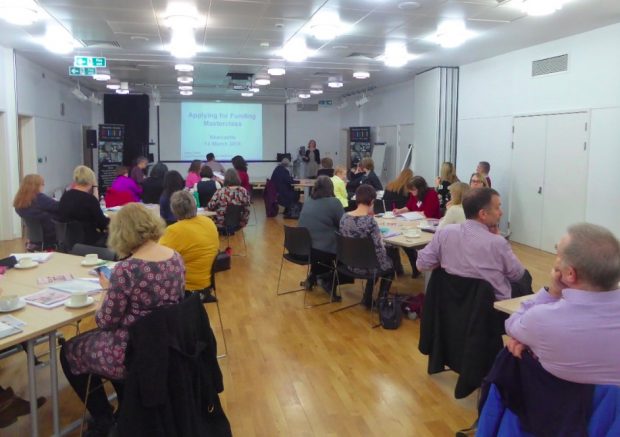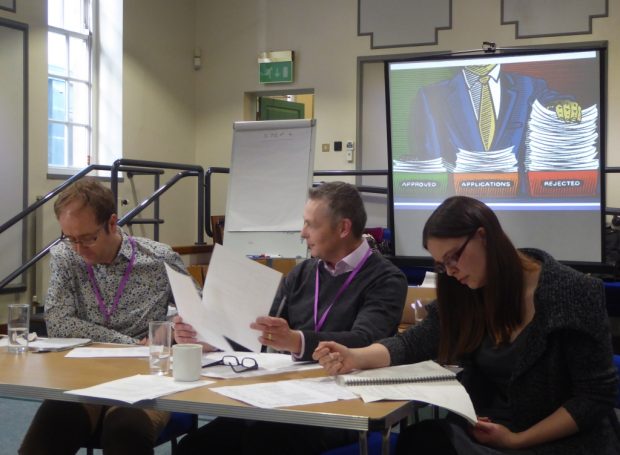To complement a series of masterclasses run by Arts Council England which shared advice and guidance about how to apply for their funding, we put together a programme of events which collated advice and ideas from a wide range of other funding bodies. We produced a pack of material, which include a template of questions to ask as you work through the process.
We held masterclasses in four different libraries: in Lincoln central library, Greenwich centre in London, Bristol’s J3 library, and Newcastle central library. Each followed the same format, but we invited a range of different speakers, so discussions varied and different tips and experiences were shared.

This post will draw out common themes and tips that presenters shared, and highlight some of the comments that participants made. Plus it will link to all the slides - through a list at the end.
To summarise
Some of the top tips that came out in many of the presentations were:
It is hugely important to get a fresh pair of eyes to review your bid before it is submitted. Ask someone unconnected with your project to read your bid and then tell you what they think your project is about, why it is needed, what it’s going to do, and how people will know if it has been a success. This is a great way of checking that you actually have written what you thought you’ve written!
Don’t forget to spell out the value of this project happening in a library context. Never assume people on bid review panels will know your unique selling points. Andy Wright shared a great definition - any elements of which will be excellent for setting the context in a bid:
“How do libraries differ from other public spaces? What makes them unique? Libraries are where people go to explore, to interact, to imagine. They are a uniquely trusted, politically neutral, non-judgemental space, full of curated information resources; they are centres for art and culture, centres for diverse populations, catalysts for building communities. Public libraries are the great equaliser, universities for whoever wishes to make use of them, a place where the like-minded can connect. According to the The Arts Council review into the economic contribution of public libraries, ‘what the available evidence shows is that public libraries, first and foremost, contribute to long term processes of human capital formation, the maintenance of physical and mental wellbeing, social inclusivity and the cohesion of communities’.”
Lots of comments mentioned the value of working with partners - whether from outside the sector, for example universities, or getting together with other library services to fund a joint development officer post to lead on bids
The importance of evidence in bids was repeated many times. Remember LGInform as a good source of local information, plus the Taskforce toolkit on strategic planning contains links to other sources.
Feedback from a range of different funders was valuable advice from the other side of the process. Tips includes a reminder that funders review their schemes and criteria regularly - just because you weren't eligible for any schemes last year, doesn’t mean you won’t be eligible for new schemes coming up, bidders need to keep checking both programmes - and their criteria.
Presenters discussed how local authority run library services can still look at other options to benefit from funders that will only support charities, for example by setting up a charitable arm, working with their Friends groups, or other partners who may be charities.
And finally, a recurring theme: read the requirements thoroughly, and submit what is asked! Treat an application like a job application - if the advertiser wants a single side introductory letter and an accurately filled out form, don’t send them a video and multi page brochure with lots of different examples of your work.
The workshop - session by session
Step 1: Don’t start with the money
The first session was the one that varied most from workshop to workshop, as we invited a wide range of partners to share their advice and experience. The focus was on planning and thinking that needs to be done in advance of any actual bid writing - to work through what your project was intended to achieve. Only when you are clear in your own mind will any advice on who to apply to and for what, become evident.
Everyone’s slides are included in the packs linked to below. In Lincoln, attendees heard from Andy Wright who talked about his experience working with funders on the Engaging Libraries programme. His tips included reminding library people to be proud of what they do and their plans - this enthusiasm should spill over into the bid. He was also the first of many to talk about the proportion of bids that are likely to be successful - which was exemplified loud and clear in the panel session later. He advised not to be despondent - talk to funders and get feedback, and be prepared to resubmit.
Stephanie Schonfield from the group of volunteers working to raise funds to reopen Kensal Rise library also shared her experience. Her examples showed the value of a compelling narrative and demonstrated a wide range of types of community involvement - as well as showing funders how the proposals would benefit that community.
The workshop in Greenwich was reduced in size as many people were unable to travel due to snow. But those who managed to get in heard from Sue Wills about Cambridgeshire’s businesslike approach, including mapping your requests to the funding organisations priorities, commissioning and income generation, then Zoinal Abidin from Barking and Dagenham who also emphasised adopting a business mindset and the importance of a compelling story.
The audience in Bristol heard from Laura Worsfold who talked about the creation of The Hive in Worcester - England’s first (and still only) joint Academic and public library. Her focus was on partnership, as they started with lots of initial investment (PFI) - and thus perhaps fundraising was even harder, as the perception was that they had lots of money in place. They made a point of setting expectations, and confirmed it was time well spent to step back and work out their priorities.
Finally in Newcastle, Cath Shea shared St Helens tips on finding the right partners and talked about match funding.
After each set of presentations there was a practical exercise, where participants were invited to use the template to work through an example they had brought with them, using the questions as triggers to see if discussion stimulated any fresh thinking and new approaches. Also to hone their existing ideas into a potential bid. The template is contained in the pack linked to below and published on GOV.UK.
Step 2: You’ve defined your project, now what?
Details of this session are in the slides linked below - and all were delivered by speakers from Locality. Highlights are:
- opportunities come and go
- fewer opportunities for projects run by local authority
- need for diverse sources of income
- questions of longer term financial sustainability
- challenge around using space creatively - maybe those who use your space can raise the funding, then pay you to run the activity
- nurture the entrepreneurs
- teams need access to a pool of people with the skills needed to bid successfully
The session also included information on specific funders, and where to look for them.
Step 3: Getting the money - maximising the chances of success
The essence of this session was to remind bidders of the importance of confidence, and not undervaluing the thing you were bidding for. “Believe in what you do and show it” as one of the presenters said. A robust business case is important, but it doesn’t need to be complex - it needs to confirm your aims and the financial bottom line.
Ask for what you need, and that means everything - if your project needs a project manager, include that in the bid. And focus on outcomes - that was a recurring theme from most funders.
From the start, you should be thinking about progression - and perhaps even an exit strategy. It reflects well on a bid that tells the whole story and shows that you have thought about what comes next.
As had been said many times, key to maximising the chances of success is to be clear about the funders objectives - read about their priorities and especially the terms of any specific fund. One particular piece of advice was to treat a funding application like a job application. Remember that funders may also research you/your organisation. Make sure that the evidence you provide is verifiable and up to date - in particular, check your social media accounts/website - they need to be active and up to date.
And a tip for what happens when you hear the result, good bid writers tend to score 1:5, so don't get down-heartened by rejection. Ask for feedback.
The slides below share a collection of feedback gathered from a range of funders as to their current priorities and how to succeed. I won’t re-list it all here - scroll to step 3 in any of the slide sets.
Participants then broke into groups to discuss what they had heard, and feedback included:
- the recognition that it was important not to under-value library assets
- the importance of not underestimating the sign off process within an organisation - make sure those who need to know are aware of deadlines
- think about matchfunding - and remember that staff time can be counted as ‘in kind’. Room space and support for events can also count. Think laterally
- when putting a bid together, look for different skills around your team. Some will be better at narrative, some at finding evidence, some gathering (or remembering) examples - collective work will strengthen engagement in the project
- and there was discussion around getting the right people with the right skills for a project - and how to identify the market rates for particular people - from project managers to artists
Step 4: How your bids will be assessed
This session was run as a panel, using completely fictitious bids, for an imaginary fund. Panel members were different in each location, but all had experience in assessing bids. It gave participants the opportunity to see just how brief some of the discussions on individual bids can be - where the panel started out by discussing their initial scoring, deciding which bids were either clearly a yes or a no, and then concentrating their discussion on those where there was any disagreement, or where bids were marginal (either for good or bad). In fact after one panel, the first question was around how realistic it was. The answer was absolutely; while fictional, all the panel members were drawing on their real experience.

The session endorsed the importance of advice that had been shared throughout the workshop - such as the vital importance of reading the criteria, and answering the questions as asked, not sharing masses of material ‘just in case they might find it useful’. It was also interesting for us to note, that in each of the 4 panels, the assessors drew out different points from the bids, and focused on different criteria of the imaginary fund - just as we’re sure happens in real life.
Whilst much of the underlying discussion (and learning points drawn out) was consistent, the panels didn’t come to the same conclusion each time - which does emphasise the fact that however objective assessors attempt to be, it’s an art as much as a science. Ultimately people writing bids are making a case to real people who will bring all sorts of different knowledge, attitudes, preferences and previous experience to the room - and that will have an impact on their decisions.
Step 5: You’ve got your money - what next?

Tips shared, and reflections from participants included the following:
- don’t forget to line up everyone you will need - anticipate success, even though you don’t commit until you hear
- remember to do all the paperwork - there will be a process before funds are released “Don’t forget the details - if you need to sign and return something, don’t risk losing the money.”
- celebrate your success: at achieving funding, but also as other milestones of the project are reached
- reporting will be part of the funding process, so factor it in to your project plan - and think ahead about evaluation
- collect data as you go along, don’t leave it till the end
- effective evaluation will give you advocacy material for future bids
And for anyone who wasn’t in Greenwich, participants there heard a presentation from the Carnegie UK Trust, which focused on evaluation. Douglas White’s talk included reasons to evaluate a project; specific points of process - including self evaluation (and ideas about when independent evaluation should be commissioned), phone calls, interviews and visits; and ways of recording information for evaluation.
Further information
The pack is available from our website.
Presentations:
- Slidepack from Lincoln - including case studies from Andy Wright, and experiences fundraising for Kensal Rise library, plus information from Locality
- Slidepack from Greenwich - including case studies from Cambridgeshire, and Barking and Dagenham, and information from the Heritage Lottery Fund, and Carnegie UK Trust
- Slidepack from Bristol - including case studies from The Hive and Kensal Rise, plus information from Locality
- Slidepack from Newcastle - including case studies from St Helens and Andy Wright, plus information from Locality
Final thoughts on next steps
A topic that came up during discussions was evaluation. It was mentioned as an important part of this process, plus of course being an important part of delivering any activity and creating evidence that forms a vital part of any planning cycle. A need for more information on this topic has been fed into the Taskforce priorities list for 2018, and we’ll work with people to define the need thoroughly with a view to running a workshop and creating a toolkit later in the year. It will likely include material on Theory of Change, and gathering user feedback - so will also relate neatly to another workshop planned on measuring impact in library work.
If there are aspects of either of these topics that you would like to find out more about, please contact us on librariestaskforce@culture.gov.uk to help shape the programme.